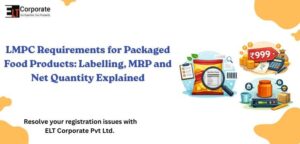The Legal Metrology Packaged Commodities Rules, 2011, are important packaging and labeling regulations in India. These rules apply to all pre-packaged goods sold to consumers, even food, electronics, cosmetics, or household items. Ensuring that clients receive accurate information about all items, including MRP, net amount, expiration date, and manufacturer data, is the primary goal. To learn about the most recent changes and much more, visit this blog.
What are the Legal Metrology Packaged Commodities Rules, 2011?
The Legal Metrology Packaged Commodities Rules, 2011, are India’s main labeling and packaging regulations made under the Legal Metrology Act, 2009. They list all of the information that must be on every retail package, how it must be presented, and the tests that officers can use to confirm the accuracy of the net quantity. Food, cosmetics, electronics, medical supplies, and home items are all subject to the regulations since they are sold in pre-packaged forms.
- To protect consumers from short weight or misleading packs.
- To standardise declarations so shoppers can easily compare brands.
- To give enforcement officers clear power to inspect, seize, or penalise non-compliant packs.
- To align India with international best practices on weights and measures.
Which Products are Covered Under the Legal Metrology Rules?
In India, all pre-packaged products delivered to customers are subject to the Legal Metrology Packaged Commodities Rules, 2011. These regulations ensure that items’ packaging conveys accurate and transparent information about pricing, quantity, and which products are covered. This is important for retailers, importers, and manufacturers.
Who Regulates the Legal Metrology Packaged Commodities Rules in India?
The legal metrology packaged commodities rules in India are regulated by the Department of Consumer Affairs, which works under the Ministry of Consumer Affairs, Food and Public Distribution. The rules are enforced by the Legal Metrology Division of this department to ensure that all packaged products sold in India adhere to fair trade practices and provide accurate information to consumers.
- Making and updating rules under the Legal Metrology Act, 2009
- Ensuring proper labelling on packaged goods as per the packaged commodities rules, 2011
- Authorising legal metrology officers to conduct inspections and take legal action
- Creating awareness about consumer rights and compliance
- Issuing and monitoring LMPC certificates for importers and packers
What are the Mandatory Declaration on Packaged Commodities?
Here are some Important declarations on packaged commodities as per Legal Metrology Rules:
- Name and Address of the Manufacturer/Packer/Importer – It helps to identify the source of the product.
- Common or Generic Name of the Product – For example -Wheat flour, shampoo, toothpaste
- Net Quantity – For example, weight, volume, length, or number.
- Month and Year of Manufacturer/Packing/Import – It shows when the product was packed or imported.
- Maximum Retail Price (MRP) Inclusive of all Taxes – Final price payable by the consumer. No extra charges allowed.
- Customer Care Contact Details – It includes a phone number or email for consumer complaints or queries.
- Country of Origin – Should be declared for transparency under e-commerce and import regulations.
- Consumer Complaint Email or Helpline Number – For quick grievance redressal.
- Best Before/Expiry Date – Especially for important food, cosmetics, and medical products
Latest Amendments in Legal Packaged Commodities Rules, 2011
| S.No. | Amendments | Descriptions |
| 1. | Country of Origin Declaration (2020) | Mandatory to mention the country of origin of imported packaged goods |
| 2. | No Dual MRP Allowed | Only one maximum retail price (MRP) can be declared per product |
| 3. | Flexible Declaration Formats | Higher fines for false declarations, missing labels, or selling above MRP |
| 4. | One listing should be display all important declarations (MRP, Origin, etc) | Allowed to use barcodes, stickers, and digital printing of clearly visible |
| 5. | E-Commerce platform Accoutability | One listing should display all important declarations (MRP, Origin, etc) |
| 6. | Relaxation for MSMEs/Small Manufacturers | Temporary relaxation and deadline extensions during special circumstances |
What are the Penalties for Non-Compliance with LMPC Rules?
Here are some penalties for non-compliance with the LMPC rules, 2011. Check the following points:
- 2,000 fines for minor labelling mistakes such as MRP, net quantity, or expiry date.
- 25,000 fine (or more) for repeated or serious offences related to false or misleading labels.
- Seizure of goods that violate LMPC labelling rules or have incorrect declarations.
- Legal actions and court cases for wilful violations or fraud.
- Business license suspension or cancellation in case of continuous non-compliance.
Can ELT Corporate Help With LMPC Compliance and Registration?
ELT Corporate can help you with complete support for LMPC compliance and registration. As one of the best regulatory consultancies in India.
- Expertise in legal metrology & LMPC rules
- Fast and hassle-free LMPC Certificate Approval
- Support for Importers, Manufacturers & E-Commerce Sellers
- Guidance on packaging, labelling, & declarations
- Mock Audit & Inspection Readiness Support
- Complete Documentation Assistance
- Help with License Renewal & Amendments
- Trusted by 2500+ Clients Across India
Is LMPC Registration Mandatory For E-Commerce Sellers?
Yes, LMPC registration for e-commerce sellers is mandatory if you are selling pre-packaged goods online.
What If I Forget To Update The Label After a Rule Change?
Basically, if you forget to update the label after a rule change, you may face penalties, product seizure, or legal actions during inspection.








